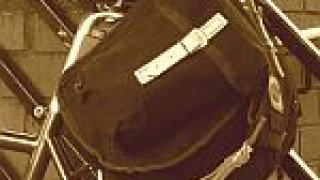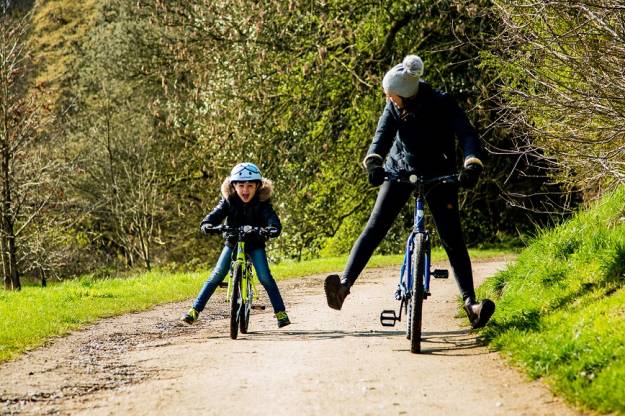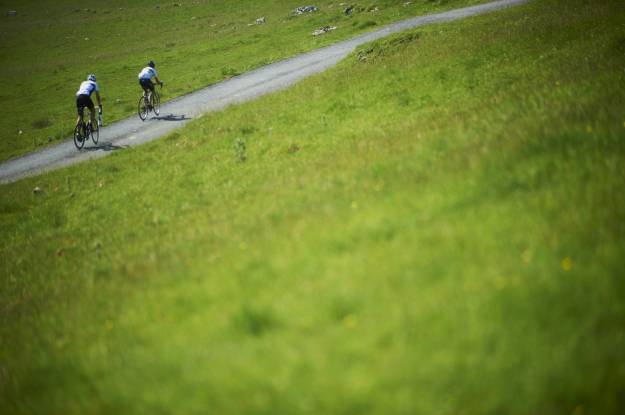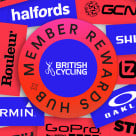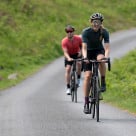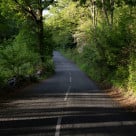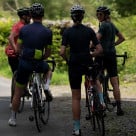Retro: Cycling Through the War
 World War Two made the bicycle the vehicle for personal transport in Britain. The young and old could wobble along our roads in those days with no danger from speeding cars. There weren't any cars - or hardly any. You could cycle for miles without seeing anything but the odd lorry. Military vehicles were the main motorised transport on our roads, and they usually came together in long convoys.
World War Two made the bicycle the vehicle for personal transport in Britain. The young and old could wobble along our roads in those days with no danger from speeding cars. There weren't any cars - or hardly any. You could cycle for miles without seeing anything but the odd lorry. Military vehicles were the main motorised transport on our roads, and they usually came together in long convoys.
People cycled to work, often long distances. Unless you were running the war effort in a big way you had no petrol ration. Most men in my road cycled to work, coming back slower in the evenings after long days in the factories. "Old Tom", a labourer with the building firm I worked for before being called up for National Service used to cycle eight miles each way in all weathers, although he was well passed seventy and his bike looked even older. It wasn't easy for him, and he was no longer travelling in a straight line as he arrived on site in the morning. He always needed a fag and a rest before starting to mix the cement for the bricklayers.
Old Tom was so old he'd never been to school - so he told us. We used to calculate his pay each week because he couldn't check it for himself. Yet despite his reasonable wage in wartime Britain he never bought a better bike to make his cycling easier. He just used the old one while helping to repair homes Hitler bombed on the Welling Estate near London. Some homes got bombed a second time and we went back and repaired them again, and Old Tom kept cycling sixteen miles a day to help in the work.
As teenagers on bikes we never worried about the miles or the hills. And we never walked when we could ride, though some of our bikes weren't much better than Old Tom's. The first bike I had - bought from a boy at school for twelve shillings - had a red tyre on the front and a black one on the back. There seemed nothing odd about that, or that the bike had only one inefficient brake, worked by a lever at the top of the handlebars. On summer evenings and weekends my mates and I toured the local countryside. Sometimes we got caught in air raids, but people would always let you share their shelters, sometimes offering tea and biscuits while waiting for the siren to sound the "all clear". Actually, we were not worried about being hit by a bomb - the chances of that were small. It was shrapnel from our exploding shells fired at German aircraft that we sheltered from. Jagged pieces of metal could come down like giant hailstones, hitting tiled roofs, if you were near a gun battery. We used to find plenty of these piece of lethal metal on the ground after raids, so it's strange that I never knew of anyone who was hit by shrapnel, though the worrying possibility was clearly present.
 But the air raids never stopped us from cycling to all parts of our locallity. We were in peak physical condition without knowing it. "Obesity" was an unknown word - and so was the condition. With the exercise we had on wartime rations it couldn't exist. A friend and I once cycled seventy miles from Sidcup to Folkestone to stay with my aunt. We cycled along what was then called "the arterial way", the Motorway of its day. As we passed through the countryside, the road was so empty one could have thought that aliens had invaded and everyone was dead. After a few days holiday we cycled back seventy miles, had tea and played a cricket match in the evening.
But the air raids never stopped us from cycling to all parts of our locallity. We were in peak physical condition without knowing it. "Obesity" was an unknown word - and so was the condition. With the exercise we had on wartime rations it couldn't exist. A friend and I once cycled seventy miles from Sidcup to Folkestone to stay with my aunt. We cycled along what was then called "the arterial way", the Motorway of its day. As we passed through the countryside, the road was so empty one could have thought that aliens had invaded and everyone was dead. After a few days holiday we cycled back seventy miles, had tea and played a cricket match in the evening.
Most of our cycling was in daylight. Bikes at night needed lights suitably dimmed, presumably to prevent sharp-eyed German aircrews from spotting us as we cycled along. But batteries cost money so we seldom had lights. At that time in our history you could be prosecuted for cycling on a pavement, and cycling without dimmed lights to conform to wartime regulations was a grave offence. The police were paranoid about anyone riding at night without proper lights. A black metal shield with a horizontal slit had to cover the front light. But the slit directed so little light downward that it was difficult to see the road. It's hard now to appreciate how dark it could be in the blackout on a moonless night with no street lighting or light from houses. Visibility could be down to about a yard. One night it was so dark I cycled into someone's garden wall and found myself on my back lying on the lawn. I then had difficulty finding my bike because the collision had put out my lights. On another night a friend and I lost the road completely and ran into a brick wall. We never saw it until we hit it.
Most adults did comply with the blackout regulations, but teenagers are not ready compliers and during night-time rides the police often chased us for having no lights. It was never a fair chase. Young fit policemen were in the forces and only middle-aged policemen patrolled the neighbourhood, and then on heavy old bikes. So a policeman could never catch us if we spotted his dimmed front light approaching. But things could go wrong. One dark night I was cycling along when a policeman jumped out from the pavement and stopped me for having no lights. At that particular time this was not completely true. I did have a dynamo that should have been generating current from contact with the back tyre. I explained to the suspicious constable that somehow the dynamo had lost contact, and offered to demonstrate that it did work. I adjusted the dynamo and moved back about twenty yards. Space was needed to generate enough speed to drive the dynamo. The policeman didn't move, but as I increased speed my foot slipped on one pedal. Before the policeman could see any light I had knocked him flat. He got up unshaken. "Steady lad," he said, as he brushed himself down. "Now let's have your name and address."
A court summons soon arrived. By chance my next-door neighbour was an understanding police sergeant who helped me write to the court to express my guilt and deep regret for what had happened. The magistrate was horrified that anyone on a bicycle had knocked down a policeman on the highway, and he fined me two shillings and six pence. After that brush with the law my parents bought me new battery powered lights for my bike, and the dynamo was retired to a canvas bag with all my other bicycle bits and pieces.
After cycling for a couple of war years in our early teens on dilapidated bikes, we began to aspire to better things. And despite the need to make Spitfires and other weapons of war, there were a surprising number of good bikes being manufactured by BSA, Raleigh, Dawes and other makers. But Claude Butler bikes were considered the best in those days and we used to cycle miles to Lewisham to view the various models in their shop window.
Eventually I saved up half the money needed to buy one and my Dad gave me the other half. I went to Lewisham by tram and cycled home on a bright metallic orange bike. It was much admired by neighbours and passers-by who in those days were accustomed to all bikes being black. By today's standards it was like parking the latest Porsche, it attracted so much attention. Kids used to cluster round and asked questions, their main aim in life being to get a better bike. Today, of course, they'd probably try to pinch it...


